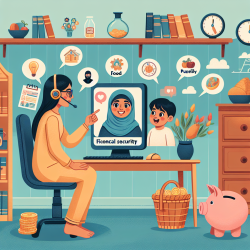Introduction
In the field of speech-language pathology, understanding the multifaceted challenges faced by children and their families during the COVID-19 pandemic is crucial. The research titled "Factors Associated with Financial Security, Food Security and Quality of Daily Lives of Residents in Nigeria during the First Wave of the COVID-19 Pandemic" provides valuable insights that can be translated into practical strategies for improving online therapy services. This blog explores how practitioners can leverage these findings to enhance outcomes for children receiving online therapy.
Understanding the Research
The study conducted in Nigeria during the first wave of the COVID-19 pandemic identified key factors associated with financial insecurity, food insecurity, and the quality of daily lives. The findings revealed that financial insecurity was prevalent among 56% of respondents, with 20.4% experiencing decreased food intake, and 90.8% reporting a negative impact on daily life. Interestingly, individuals who were depressed or living with HIV had lower odds of experiencing these challenges.
Implications for Online Therapy
For practitioners providing online therapy services, these findings highlight the importance of considering the broader socioeconomic and mental health context of the children and families they serve. Here are some strategies to consider:
- Holistic Assessment: Incorporate questions about financial and food security into initial assessments to better understand the challenges families face.
- Mental Health Integration: Collaborate with mental health professionals to address anxiety and depression, which may impact therapy outcomes.
- Resource Connection: Provide families with information about local resources for financial and food assistance to alleviate stressors that may affect therapy participation.
Encouraging Further Research
The study's findings underscore the need for continued research into the complex relationships between socioeconomic factors, mental health, and therapy outcomes. Practitioners are encouraged to engage in or support research efforts that explore these dynamics in different contexts and populations. This could involve collaborating with researchers to collect data from therapy sessions or participating in studies that examine the impact of socioeconomic interventions on therapy outcomes.
Conclusion
By integrating the insights from this research into their practice, speech-language pathologists can enhance the effectiveness of online therapy services. Understanding and addressing the broader challenges faced by families can lead to more positive outcomes for children. To read the original research paper, please follow this link: Factors Associated with Financial Security, Food Security and Quality of Daily Lives of Residents in Nigeria during the First Wave of the COVID-19 Pandemic.










